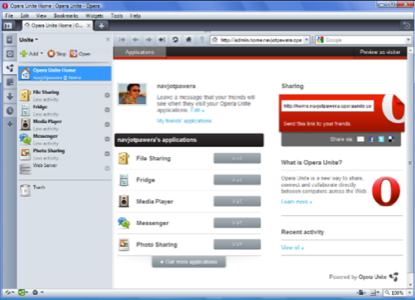Back in June of this year, Opera revealed their ambitious plan to “reinvent the web” with the release of Opera Unite, a new feature of their desktop web browser that effectively turns your computer into a server. With tools like a chat application, a photo sharing app, a file sharing app, a media player, and more, the idea behind Unite was to forgo the “cloud” and share your files with others directly from your PC instead. Using peer-to-peer technology that operates through the browser interface, Opera Unite seemed to be going against the current trend that is cloud computing and that didn’t win them much love from the tech community.

Despite its ho-hum reception, the company is moving forward with its plans to make Unite a full-fledged feature of the Opera browser. Today, the Opera Unite beta is launching and will be made available in Opera 10.10. Given the recent cloud outages, one has to wonder if Unite will be given a second look by the crowd of naysayers who so recently belittled it.
Opera Unite Beta Released
Not much about Unite has changed since its initial launch except that it initially spent several months as a standalone product before being integrated into the Opera web browser. Now, with the release of Opera 10.10, it’s clear that the company intends for Unite to be one of the browser’s core features.
Included in Unite are six applications which are the photo app, the file sharing app, messenger, the above mentioned media player, a “fridge” app that lets you post notes on your friends’ virtual refrigerators and a web server that lets you host web sites directly from your computer.

Cloud Outages Leave Users Wary; Unite Gets a Second Look?
Although the technology itself remains, for the most part, the same, what may have changed in the time that passed since Unite’s June reveal is the sentiment among Unite’s potential users. Since the original launch, there have been numerous cloud computing outages which included yet another long-lasting Gmail outage, a DDOS attack that took down social services like Facebook, Twitter, and LiveJournal simultaneously, a Facebook database maintenance issue which locked 150,000 users out of their accounts for a week, multiple Twitter outages (although these are nothing new) and, of course, the granddaddy of them all: a cloud computing disaster at Danger that erased all personal data from the hansdets of thousands of T-Mobile Sidekick users.
All these above incidents occurred in the span of only a few months, too, leaving people to question the stability of the cloud. Perhaps the cloud, often thought of as much safer and more stable than our own personal hard drives, isn’t all that it’s cracked up to be after all? Instead of just uploading everything to the web and then assuming that it will be there forever, the rash of outages have many tech geeks returning to the old-fashioned computer backup in addition to hosting content out on the web.
This hybrid approach to cloud computing (local + cloud) could mean that some of Unite’s former naysayers will give it a second look. Since it’s designed for sharing locally stored files on the web using Opera’s servers as a proxy, it taps into that whole “forgo the cloud” mentality. While Opera’s man-in-the-middle server infrastructure may crash one day (and it’s already had its struggles), your data would still be accessible assuming your computer itself doesn’t die. To some, that may seem like a safer approach than a 100% reliance on cloud providers.
Others Say: Don’t Blame the Cloud, It’s Still the Future
However, not everyone thinks that outages, even those as severe as the Danger disaster, spell failure for the cloud computing model – they’re only growing pains. Sure, “cloud computing isn’t perfect,” writes PC Mag’s Lance Ulanoff, but Danger’s failure is “a failure of, more than likely, a few over-worked IT guys who incorrectly set up data redundancy.” Ulanoff contends, and many others will certainly agree, that despite failures such as this, the cloud overall remains safer and more trustworthy than anyone’s own home or office computers.
Still, the outages may have some worried. Those who are worried enough to begin storing data back on their own computers, using the cloud only as backup and no longer as primary storage, may now be interested in trying out Opera Unite. That may give Unite a little boost for the time being. But ultimately, the technology that was supposed to change the web seems like backward progress. Cloud computing may have its ups and downs, but it’s the future of computing, not Unite’s peer-to-peer.

















